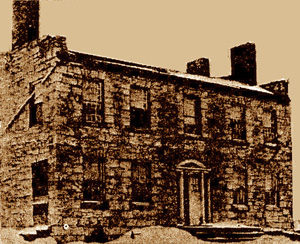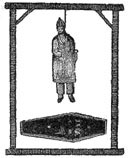|
James McLean First Man Hanged in Genesee
County, for Double Slaying 119 Years Ago
Caledonia, Feb. 27. - (Special Correspondence) -- Archibald McLaughlin, pioneer farmer, shambling along the newly built road that led south from Caledonia, on that spring day in 1807 little realized that shortly he was to play an unwelcome role in one of the most brutal murders in the annals of Western New York. Could he have seen what was to happen at his destination, it is doubtful he would have hummed a tingling Scottish melody as he moved along the highway.
XXX

Image of part of a Sunday, Feb. 28, 1926 Page 27 Rochester newspaper clipping of a story recalling Genesee County's first hanging execution.
|
|
Evidence of Work
McLaughlin’s thoughts might well have been on the monumental task in which he had had a hand since he left his native heath in Scotland ten years or so before. But it is more likely that he was thinking of some matters of less moment than that. Nevertheless he could not fail to note all around him the evidences of the struggle that he had, with his fellow-pioneers, conducted during the five years preceding. In those five years, Caledonia had risen from the wilderness.
Caledonia had risen, and it still was rising, when McLaughlin started out on his fatal journey. As he stepped angularly along, he trod the new turned earth of a highway that still was under construction. Five years before, in 1802, the walk that he was taking would have been less pleasant, for he would have been stumbling through a dense forest. The hand of these few hardy Scots had worked wonders.
XXX

The caption beneath the photo in the newsclipping reads:
The dwelling which now stands on the scene of the brutal murders near Caledonia for which William MacLean, Scotch pioneer paid the supreme penalty in 1807. He was the first man to be hanged in Genesee county.
Note it incorrectly identified the convicted murderer as William MacLean.
The house in the photo -- that tbe caption identified as on the murder site -- is actually the James R. Clark home, built in 1827 in the center of Caledonia on Main Street. There are no structures at the precise murder site.
|
|
McLaughlin might have pondered over the figure of Colonel Williams (actually Williamson), agent for The Pulteney Land Company, himself a Scot, under whose inducements this hearty band of pioneers had moved into the wilderness from Jamestown, where they had first settled when they came across from the Old World. The story, which included the ill-fated McLaughlin, arrived here in 1802, after journeying more than two hundred miles through dense forests. They called their new home Southampton. Four years later, in 1806, they changed the name to Caledonia, the early name of Scotland.
Outstanding Figure
McLaughlin was not especially a leader in the new community but his figure stands out most clearly through the years in the meager records of what occurred on this spring day in 1807. He was a typical pioneer type. Had he, as he stepped along the highway, bothered, he might have identified the various log cabins he passed on the way. There were the crude homes of the McColls, the McLeans and the Orrs, along with that of his family.
[Left third of old Batavia jail photo that appears in Bread & Butter: The Murders of Polly Frisch by Cindy Amrhein and Ellen Lea Bachorski. Click image to access NYCHS presentation page.]

OLD GENESEE COUNTY JAIL: No longer standing. Was originally on the comer of Main Street and Rt. 98 in the City of Batavia; approximately where Oliver's Candies is now located. Photo courtesy of the Genesee County History Department. |
|
Just what impelled McLaughlin to leave the settlement and start out on foot along the new highway cannot be determined at this late date, but in all probability he was bent on inspecting the work being done. He probably knew that James McLean, an ill-tempered resident of the colony, and William Orr were at work in the road just below the rude cabin home of Duncan McColl, three miles south of the settlement.
Had he stopped for a moment as he drew near the spot where the two were at work he would have seen the muscular form of James McLean, and beside him the person of William Orr. Some distance further on he would have seen Mrs. Duncan McColl, interestedly watching from the distance the workers, at the same time keeping an eye on her youngest child, then three years old. Donald McColl, her elder child, a likely lad of sixteen hardy summers, was at work clearing out some hazel brush through which the highway was to continue.
Saw Axe Raised
McLaughlin, if he stopped to look, saw McLean suddenly rise and gesticulated in an enraged frenzy at his fellow workman. Undoubtedly, the stroller started forward on a run when he saw McLean raise his ax above his head, threatening Orr. The fact remains that the blow crashed down before he could reach the scene. Orr fell dead to the ground, his skull cleft from the heavy broad ax in the hands of a powerful man.
Rushing forward, McLaughlin fell to his knees beside the murdered man. McLean, his mind crazed by the sight of the calamity that he had wrought, swung about and smote the kneeling McLaughlin with the bright blade. The heavy ax cut him to the heart.
[Left third of old Batavia jail photo that appears in Bread & Butter: The Murders of Polly Frisch by Cindy Amrhein and Ellen Lea Bachorski. Click image to access NYCHS presentation page.]

OLD GENESEE COUNTY JAIL: No longer standing. Was originally on the comer of Main Street and Rt. 98 in the City of Batavia; approximately where Oliver's Candies is now located. Photo courtesy of the Genesee County History Department. |
|
So it was but the work of a moment, and two lives had been snuffed out. The argument was trivial, but the maddened man had gone amuck. Donald McColl, rushing forward, brave in his foolhearty (sic) youth, wrested the ax from McLean’s hands, and ran for the hazel brush. He was not a moment too soon, for the maddened McLean made for him, intent on claiming another victim. Donald was too fleet on foot, and he tossed the ax deep into the undergrowth as he ran. Mrs. McColl, who had witnessed the entire happening fled for her home a few steps from the scene, slammed the door, and stayed inside until the citizens from the settlement came. Donald ran all of the three miles into town. He reached the village almost frightened out of his sense, but able to arouse the citizens.
Roams in Forest
The horror of his acts swept over McLean as he found himself alone in the woods, and he plunged into the wilderness. For weeks, he roamed madly through the dense forest, hiding in hollow logs. It is said that he received food from his mother.
It was three weeks later that McLean, nearly famished, wandered into a tavern at Canandaigua. Posted at one end of the bar he saw a poster. It offered a large reward for his capture, dead or alive. The landlady saw the interest of this stranger in the poster, and noting that his unusually long arms corresponded to the description in the notice, quietly notified officials.
[Left third of old Batavia jail photo that appears in Bread & Butter: The Murders of Polly Frisch by Cindy Amrhein and Ellen Lea Bachorski. Click image to access NYCHS presentation page.]

OLD GENESEE COUNTY JAIL: No longer standing. Was originally on the comer of Main Street and Rt. 98 in the City of Batavia; approximately where Oliver's Candies is now located. Photo courtesy of the Genesee County History Department. |
|
He was arrested and taken to the Batavia jail, where he was tried and convicted and hanged, with quick justice. He was the first man to be hanged in Genesee County.
It is said that during the time he was in jail, he was visited by a clergyman who found him a sincerely penitent man and who was able to convince him that a merciful God would forgive him. In that hope, he met his death. The story is told that the rope broke as McLean’s weight fell. While another rope was being secured, McLean remarked that as he killed two men he deserved two hangings.
McLean was an uncle of Alexander McLean, for many years a member of the police force, and chief of police in Rochester for many years. Although a century and a quarter has passed, the old McColl homestead has been pointed out as haunted, and superstitious ones imagine that these Scots come back each spring in spirit and reenact this murder.
|



